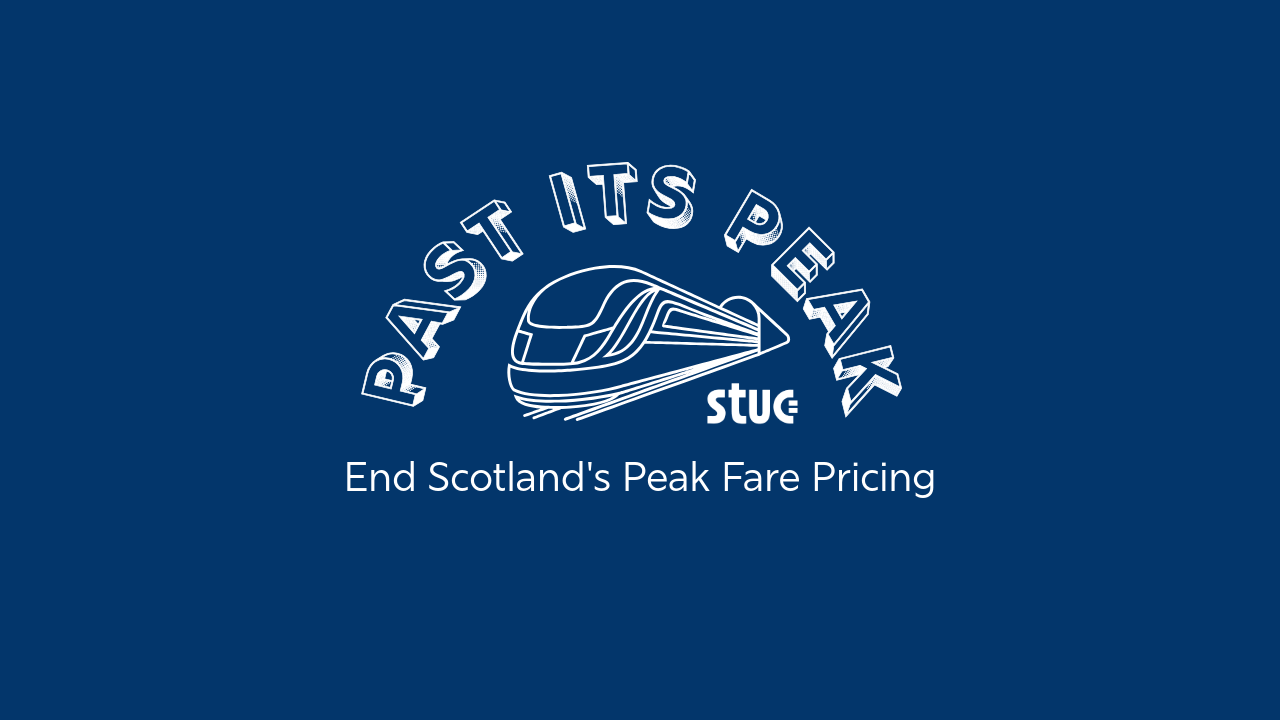 Scotland’s largest trade unions and environmental groups have joined together to demand an end to peak rail fares on Scotland’s railway.
Scotland’s largest trade unions and environmental groups have joined together to demand an end to peak rail fares on Scotland’s railway.
Following the “inexplicable” decision from the Scottish Government to reinstate peak fares following a successful pilot of off-peak ticket prices, the Scottish Trades Union Congress (STUC), rail unions and environmental groups have launched our new campaign ‘Past its Peak: End Scotland’s Peak Fare Pricing’.
The campaign seeks to harness public frustration and push for affordable, accessible rail travel as a key measure to reduce carbon emissions, support workers, and stimulate economic growth. The campaign involves a petition, public actions, and engagement with political allies, aiming to reverse the decision and promote fair pricing for all rail passengers.
We will be ramping up activity around this campaign in the coming weeks and months.
On the 17th of September 2024, we wrote to the Cabinet Secretary for Transport, Fiona Hyslop MSP, encouraging the Scottish Government to think again and reinstate the trial with a view to abolishing peak fare pricing for good.
You can read the letter signed here.
Signatories include; STUC, RMT, Unite, ASLEF, TSSA, Friends of the Earth Scotland, Get Glasgow Moving and the Just Transition Partnership.
--------
Commenting, STUC Deputy General Secretary Dave Moxham said:
“Ending an ultimately successful trial of removing peak rail fares shows a clear lack of foresight from the Scottish Government and fundamentally weakens any ambitions they have on climate, sustainable travel, or upholding standards in our public services.
“As it stands, workers will simply be unable to afford their commute to work whilst this inexplicable tax on travel remains in place.
“Our campaign, representative of the trade union, environmental and sustainable travel movement across Scotland is clear that the Scottish Government is running a real risk of derailing progress in supporting workers and our climate. They must see sense and extend the pilot before it’s too late.
RMT general secretary Mick Lynch
“The Scottish Government’s decision to reintroduce peak fares is a step backwards. This trial was proven to increase rail usage and shift journeys away from cars, directly supporting Scotland’s climate goals. At a time when we need bold action on public transport, the government has chosen to push commuters back into cars and make rail travel unaffordable for many. We urge them to reverse this short-sighted decision.
“There have been four million additional rail journeys over nine months, with approximately two million of those journeys shifting from cars to trains.
“The Scottish Government’s rail budget for this year was already cut by 10% whilst the roads budget increased by 25%, and now its decision to reintroduce peak fares is a clear indication that public transport is not being prioritised in Scotland”
TSSA General Secretary, Maryam Eslamdoust
“By ending the trial on abolishing peak fares instead of making the arrangement permanent the Scottish Government has demonstrated a lack of ambition and commitment to tackling key issues such as poverty, inequality and the climate crisis. This decision will hurt hard-working passengers and damage the wider economy.
“The Scottish Government has already rolled back their flagship target of reducing greenhouse gas emissions by 75% in 2030. Significant modal shift from cars to trains is needed for the Scottish Government to achieve their remaining target of net zero by 2045. Cancelling the trial suggests that they are not truly committed to that target.
“We urge the Scottish Government to rethink this damaging decision and to permanently abolish peak fares in Scotland.”
ASLEF District Organiser, Kevin Lindsay
“Restoring peak fares is a disastrous, short-sighted decision by the Scottish Government. Scotland needs a world-class rail service and a central part of that is to make rail travel affordable, accessible and attractive to passengers and for those who want and need to use our railways more.
“Affordable rail travel will help people make that modal shift from road to rail and help Scotland meet our targets to reduce C02 emissions. How on earth can Scotland meet our climate targets if it makes rail travel, the most environmentally sustainable way to travel, unaffordable for huge swathes of the Scottish population?
“The economic impact for workers from restoring peak fares is equally catastrophic. Peak fares are no more than a tax on workers and they will feel the extra cost at a time where their personal finances are already under considerable pressure. The knock on effect of this decision will be workers having less to spend in their local areas, which will also impact businesses and local economies across Scotland.
“The Scottish Government has not properly thought this decision through. We implore them to think again and find this investment, in their next budget, that is needed to help protect and grow our economy at the same time as giving Scotland a chance to meet the Government’s own climate targets and their target to reduce car travel by 2030.”
Unite lead industrial officer, Pat McIlvogue
“The return to peak time rates is a tax hike on workers who have no option but to use a train as part of their journey to work.
Doubling the cost of journeys means less take home pay for workers and be in no doubt this will have a direct negative impact on the ability of people to pay for day to day living costs including gas and electricity bills which during the winter months will also hike in cost.
“It’s a bitter irony that the Scottish Government who are intent on driving towards net zero seem to care not one iota about one of the methods of travel which can help us achieve that objective. The scheme was working because it had increased rail usage by nearly 7 per cent. It is a reckless move which will backfire on Scotrail and the government.”
-600.png)

-600.png)

